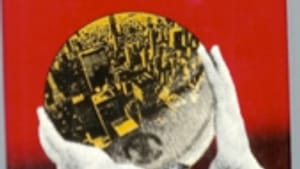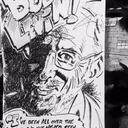Stay in the Loop
BSR publishes on a weekly schedule, with an email newsletter every Wednesday and Thursday morning. There’s no paywall, and subscribing is always free.
How the world works: A Philadelphia lesson, c. 1961
How the world works (Philadelphia, 1961)

My cousin Lester told me that within the 48 hours following his son Jason's high school graduation, the lad had picked up four moving violations and attended a party raided by police. The good news was that he had timely fled. The bad was he'd left behind his wallet, which set two constables at Lester's front door.
"Jason's learned a valuable lesson," Lester told me. Aside from making sure his ID was in his pocket, I was not so sure. I could not recall anyone I knew at 18, 19, 20 who had learned a lesson that deterred him from any similar transgression, no matter how much hard time they'd served.
But maybe I was thinking of my own stint behind bars. It had followed my bust, with Max Garden, in Center City, the summer of 1961 for"“ and this will really date me"“ illegal possession of alcoholic beverages, four quarts of Miller's on the floor of his family's Plymouth. (We were 19 and the drinking age in Pennsylvania was 21.)
Two hours in jail
As viewers of "The Wire" know, street wisdom has it that you only serve two days: The day you go in and the day you come out. In Max's and my case, make that "hours," which, in any event, were good enough to become the basis for the harrowing prison scene in my novel, The Best Ride to New York, available from the author's garage, $5 including postage and handling.
My father took the news with less aplomb than Lester. What he said basically was, "If you're so fucking stupid as to get caught, you shouldn't be drinking." The slap to my self-image of myself as an aspiring Hot Shit stung as much as a quirt. But Dad was concerned that so blemished a record would mark me morally unfit for admission to the bar— which, the entire family assumed, was a mere six years away. And he was worried, I suspect, that he might prove incapable of erasing this scar.
My father the fixer
For my father prided himself on his ability to get things done. Three decades of work for Philadelphia's Democratic City Committee as an attorney and ward leader had positioned him to fix tickets and fatten college scholarships and fill toll-taker positions on the Ben Franklin Bridge. (He was a mini-Jewish padrone.)
But these powers came from credits built and debts owed within the context of mid-century, big-city machine politics, where each side took care of its own and connived how best to bury the opposition on Election Day. And the magistrate before whom I was to appear, the Hon. Cornelius J. McGarrity, was a cranky, six-term, similarly schooled Republican, who ran his court with less courtesy and due process than post-doctoral students afforded their laboratory rats.
A gorilla's scowl
Max and I, in suits and ties, sat on a wood bench with my father in-between. McGarrity was a small man, but his scowl was as ferocious as that of Bamboo, the Philadelphia Zoo's recently deceased gorilla, who'd kept in shape between maimings of his keepers by flinging feces at the paying guests. The hearing room was hot, and the crowd of vagrants, disorderly conductors, and the lewdly behaved exuded a sulphurous mix of boredom, anger and shame.
While McGarrity dispensed his first half-dozen pellets of justice"“ fines of $25, $50, $100"“ I searched the walls for a time machine to transport me 24 hours into the past, when I had been free, untainted and immune. A growl caught my attention.
"Levin representing Levin." McGarrity looked up from the docket sheet.
"Good morning, your honor," my father said.
McGarrity appraised the situation. There was, I believe, in this moment of mental weights laid upon mental scales, a recognition of a brotherhood beyond intramural political strife"“ an epiphanic clanging of fathers and sons and shoes on other feet.
"I've been drinking beer since I was 12," McGarrity said. "Now they've made a crime out of it. Case dismissed."
The summing up
Outside, my father uttered no further threat or counsel. He either assumed them unnecessary or feared to hurt me further.
After he left, Max proposed we celebrate by hoisting a few, but I was a more responsible citizen and more prone to atonement. It took me a week or two to fall from the straight and narrow.
But fall I did. To embrace the mercy my father had ushered forth too deeply would have betrayed my need to know what more powerful or capricious fates would have me become.
"Jason's learned a valuable lesson," Lester told me. Aside from making sure his ID was in his pocket, I was not so sure. I could not recall anyone I knew at 18, 19, 20 who had learned a lesson that deterred him from any similar transgression, no matter how much hard time they'd served.
But maybe I was thinking of my own stint behind bars. It had followed my bust, with Max Garden, in Center City, the summer of 1961 for"“ and this will really date me"“ illegal possession of alcoholic beverages, four quarts of Miller's on the floor of his family's Plymouth. (We were 19 and the drinking age in Pennsylvania was 21.)
Two hours in jail
As viewers of "The Wire" know, street wisdom has it that you only serve two days: The day you go in and the day you come out. In Max's and my case, make that "hours," which, in any event, were good enough to become the basis for the harrowing prison scene in my novel, The Best Ride to New York, available from the author's garage, $5 including postage and handling.
My father took the news with less aplomb than Lester. What he said basically was, "If you're so fucking stupid as to get caught, you shouldn't be drinking." The slap to my self-image of myself as an aspiring Hot Shit stung as much as a quirt. But Dad was concerned that so blemished a record would mark me morally unfit for admission to the bar— which, the entire family assumed, was a mere six years away. And he was worried, I suspect, that he might prove incapable of erasing this scar.
My father the fixer
For my father prided himself on his ability to get things done. Three decades of work for Philadelphia's Democratic City Committee as an attorney and ward leader had positioned him to fix tickets and fatten college scholarships and fill toll-taker positions on the Ben Franklin Bridge. (He was a mini-Jewish padrone.)
But these powers came from credits built and debts owed within the context of mid-century, big-city machine politics, where each side took care of its own and connived how best to bury the opposition on Election Day. And the magistrate before whom I was to appear, the Hon. Cornelius J. McGarrity, was a cranky, six-term, similarly schooled Republican, who ran his court with less courtesy and due process than post-doctoral students afforded their laboratory rats.
A gorilla's scowl
Max and I, in suits and ties, sat on a wood bench with my father in-between. McGarrity was a small man, but his scowl was as ferocious as that of Bamboo, the Philadelphia Zoo's recently deceased gorilla, who'd kept in shape between maimings of his keepers by flinging feces at the paying guests. The hearing room was hot, and the crowd of vagrants, disorderly conductors, and the lewdly behaved exuded a sulphurous mix of boredom, anger and shame.
While McGarrity dispensed his first half-dozen pellets of justice"“ fines of $25, $50, $100"“ I searched the walls for a time machine to transport me 24 hours into the past, when I had been free, untainted and immune. A growl caught my attention.
"Levin representing Levin." McGarrity looked up from the docket sheet.
"Good morning, your honor," my father said.
McGarrity appraised the situation. There was, I believe, in this moment of mental weights laid upon mental scales, a recognition of a brotherhood beyond intramural political strife"“ an epiphanic clanging of fathers and sons and shoes on other feet.
"I've been drinking beer since I was 12," McGarrity said. "Now they've made a crime out of it. Case dismissed."
The summing up
Outside, my father uttered no further threat or counsel. He either assumed them unnecessary or feared to hurt me further.
After he left, Max proposed we celebrate by hoisting a few, but I was a more responsible citizen and more prone to atonement. It took me a week or two to fall from the straight and narrow.
But fall I did. To embrace the mercy my father had ushered forth too deeply would have betrayed my need to know what more powerful or capricious fates would have me become.
Sign up for our newsletter
All of the week's new articles, all in one place. Sign up for the free weekly BSR newsletters, and don't miss a conversation.
 Bob Levin
Bob Levin